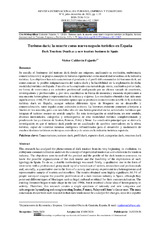Turismo dark: la muerte como nuevo negocio turístico en España
Dark Tourism: Death as a new tourism business in Spain
Autor
Calderón Fajardo, Víctor
Editor
UCOPressFecha
2020Materia
TanatoturismoTurismo dark
Perfil dark
Espectro dark
Categorías dark
Recursos dark
Thanatotourism
Dark tourism
Dark profile
Dark spectrum
Dark categories
Dark resources
METS:
Mostrar el registro METSPREMIS:
Mostrar el registro PREMISMetadatos
Mostrar el registro completo del ítemResumen
Se estudia el fenómeno del turismo dark desde sus orígenes, analizando su evolución, embrionaria comercialización y su propio concepto de turismo experiencial como modalidad novedosa en la industria turística. Los objetivos han sido caracterizar el producto y el perfil del consumidor del turismo dark, así como conocer la posible estigmatización del turista dark y la factibilidad de la explotación de dicha modalidad turística en España. Para ello se ha empleado una metodología mixta, cualitativa por un lado, en forma de entrevistas a un colectivo profesional configurado por un elenco variado de escritores, investigadores y profesionales y, por otro, cuantitativa en forma de encuesta y encuesta-experimento a una muestra heterogénea y representativa de turistas y viajeros. Los resultados obtenidos han sido muy significativos: el 66,3% de los encuestados opinan que se producirá un incremento notable de la industria turística dark en España, aunque señalan diferentes tipos de bloqueos en su desarrollo y comercialización, tanto legales como culturales o éticos. La literatura existente comenzó a forjarse a finales de los noventa, pero con una falsa idea de una heterogeneidad en las actividades turísticas que integran el turismo oscuro en sentido amplio. En esta investigación se establecen, en este sentido, diversas intensidades, categorías y subcategorías de esta modalidad turística complementando y ponderando las ya clásicas de Seaton, Fennon, Foley y Stone. La conclusión principal que se deriva la investigación es que el turismo dark puede ser un catalizador de cambios innovadores en la oferta turística, capaz de valorizar recursos endógenos infrautilizados para el desarrollo y maduración de muchos destinos turísticos en tiempos convulsos y de crisis en la industria turística española. This research has analysed the phenomenon of dark tourism from its very beginning, its evolution, its embryonic commercialization and even the concept of experiential tourism as a revolution in the tourism industry. The objectives were to reel off the product and the profile of the dark tourism consumer, to know the possible stigmatization of the dark tourist and the feasibility of the exploitation of such typology in Spain. To do so, a double methodology was used: firstly, a qualitative one in the form of interviews with a professional group made up of a varied cast of writers, researchers and professionals and, secondly, a quantitative one in the form of a survey and survey-experiment to a heterogeneous and representative sample of tourists and travellers. The results obtained were highly significant, 66.3% of people surveyed imagine the possible proliferation of a dark tourism industry in Spain, although they point out different types of blockages such as legal, cultural or ethical for their commercialization. The existing literature began to take shape in the late 1990s, but it involved a false idea of heterogeneity in activity. Therefore, this research creates a single spectrum of intensity and new categories and subcategories by unifying and complementing Seaton, Fennon, Foley and Stone’s classic ones. The main conclusion drawn from such research is that dark tourism can be a catalyst for changes, since it is capable of using dormant endogenous resources for development and territorial transformation in volatile, critical or turbulent times in the Spanish tourism industry.

